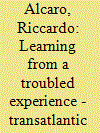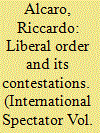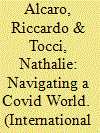|
|
|
Sort Order |
|
|
|
Items / Page
|
|
|
|
|
|
|
| Srl | Item |
| 1 |
ID:
095396


|
|
|
|
|
| Publication |
2010.
|
| Summary/Abstract |
At the beginning of the 1990s, Italy went through two tectonic changes. Externally, the end of the Cold War called for a redefinition of the roles of NATO and the EU, the pillars on which Italy had built its foreign and security policy for forty years. Internally, Italy's old ruling elites vanished under the huge mani pulite corruption scandal. The new political parties that rose in their place have remained committed to NATO and the EU, but have often met with obstacles in reconciling the national, European and Atlantic components of Italy's security. While this hinges mostly on structural factors - like the rising costs of participation in NATO or EU operations abroad, including in terms of public support - the tendency of the new elites to emphasize their differences and neglect their more fundamental commonalities have multiplied the "grey zones" in Italian security policy.
|
|
|
|
|
|
|
|
|
|
|
|
|
|
|
|
| 2 |
ID:
134535


|
|
|
|
|
| Summary/Abstract |
At the time of writing, representatives from Iran and the E3/EU+3 are trying to work out an agreement that will guarantee that Iran’s controversial nuclear programme, widely suspected of having a military purpose, serves only peaceful ends. As the negotiations enter their most crucial phase, the time is ripe to attempt an assessment of the role played by the only actor, besides Iran, that has been on stage since it all began over ten years ago: Europe. Throughout this long drama, Europe’s performance has had some brilliant moments. Yet the quality of its acting has decreased as a new protagonist, the US, has come on stage. Overall, the Europeans’ record is positive, albeit not entirely spotless.
|
|
|
|
|
|
|
|
|
|
|
|
|
|
|
|
| 3 |
ID:
179377


|
|
|
|
|
| Summary/Abstract |
For Europe, the Iran nuclear deal is a bittersweet story. Between 2003 and 2015, the Europeans played an important role in facilitating US-Iran nuclear diplomacy and eventually the agreement itself. After former US President Trump decided to exit the deal and revert to maximum economic pressure in 2018, the Europeans tried to recreate room for US-Iran engagement. While unsuccessful, they have nonetheless managed to remain relevant for both sides. The prospect of normalised economic relations with Europe has provided Iran with an incentive not to pursue nuclear weapons. As for the US, the nuclear deal – which still exists formally thanks to Europe – is the only framework available for re-engaging Iran in nuclear diplomacy, a prospect the new administration of Joe Biden has pledged to consider. Dismissing Europe’s efforts as ineffectual is therefore inaccurate since, in defending the nuclear deal, the Europeans have preserved a diplomatic bridge for US-Iranian re-engagement.
|
|
|
|
|
|
|
|
|
|
|
|
|
|
|
|
| 4 |
ID:
170040


|
|
|
|
|
| Summary/Abstract |
Donald Trump’s open espousal of an anti-EU view indicates his intent to undermine the long-standing transatlantic security community.
|
|
|
|
|
|
|
|
|
|
|
|
|
|
|
|
| 5 |
ID:
090642


|
|
|
|
|
| Summary/Abstract |
The Global Initiative to Combat Nuclear Terrorism (GICNT) is an innovative, multi-pronged action aimed at enhancing the domestic capacities of a state, as well as its ability to interconnect internationally and to deal with the risk of a terrorist attack involving nuclear or radioactive materials. The GICNT, a joint US-Russian initiative, has now evolved into an informal network of over 70 countries. It pursues an objective of boosting the protection, detection, prosecution and response capabilities of a state by fostering cooperation on three levels: between a government and its agencies; between government and the private sector; and between like-minded states. Given its comprehensive approach to the nuclear terrorism threat, the initiative has great potential. Nevertheless, structural flaws such as the absence of any evaluation mechanism and the exclusion of military-related nuclear materials and sites are likely to make its impact far less global than expected.
|
|
|
|
|
|
|
|
|
|
|
|
|
|
|
|
| 6 |
ID:
109190


|
|
|
|
|
| Publication |
2011.
|
| Summary/Abstract |
With the US eventually embracing the European-devised 'dual track' approach comprising both sanctions and incentives, the transatlantic partners have currently reached a remarkable level of convergence on how to deal with the Iranian nuclear conundrum. Although EU--US unity might not be enough to solve the dispute, the experience of transatlantic cooperation on Iran offers some important lessons. It shows that strategic convergence between the transatlantic partners, or lack thereof, has a considerable impact on the way a crisis unfolds in an area in which both parties have a stake. It highlights the added value represented by European/EU political and economic assets in a situation in which US military options are both unlikely to have the desired effect and at grave risk of backlash. Finally, it sets an important precedent for a specific option for intra-EU and EU--US cooperation - the contact or lead group - that seems to suit the emerging multipolar world better than other, more institutionalised methods.
|
|
|
|
|
|
|
|
|
|
|
|
|
|
|
|
| 7 |
ID:
158382


|
|
|
|
|
| Summary/Abstract |
The notion that we are experiencing a change in times whereby an old ‘order’ of the world is giving way to a new era has been gaining legitimacy in international debates among experts, policymakers and practitioners. Such debates are as animated as they are inconclusive in their outcomes. The contours of the upcoming era remain vague, its structure and contents undefined, its direction uncertain. Grim predictions of renewed great power competition as we have not seen since the end of the Cold War or even World War II or of an increasingly fragmented and ungovernable world abound. They co-exist though with less disheartening expectations of future global re-alignments eventually providing order. In the face of such divergent opinions, imagining the future at times looks like an act of divination.
|
|
|
|
|
|
|
|
|
|
|
|
|
|
|
|
| 8 |
ID:
180063


|
|
|
|
|
| Summary/Abstract |
The world on which Covid-19 has unleashed its destructive force is one where the partly supranational and multilateral-minded EU is ill at ease. The pandemic has devastated economies across the world and exacerbated pre-existing dynamics of growing geopolitical rivalry and the declining clout of multilateral regimes and practices. The EU’s response to the Covid shock has been twofold: on the one hand, it has embarked on a new integration effort, with the contours of a ‘transfer union’ emerging for the first time in EU history; on the other hand, it has failed to use the crisis to advance its strategic autonomy agenda. The reason for this dichotomy is that, while the severity of the Covid emergency has shifted public and elite attitudes towards economic solidarity, the lingering commitment to the US has worked as a brake on a similar trend in European foreign policy preferences.
|
|
|
|
|
|
|
|
|
|
|
|
|
|
|
|
|
|
|
|
|